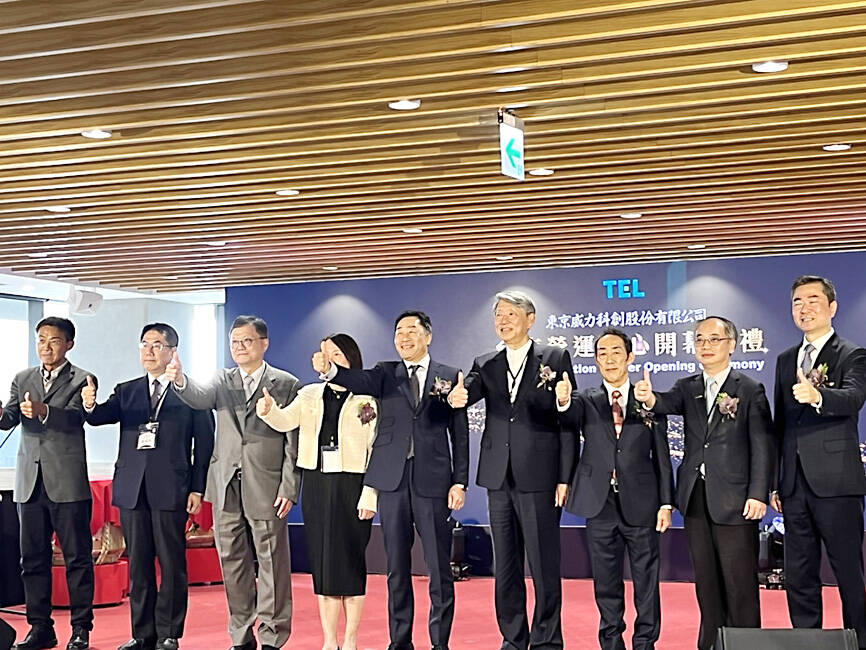Tokyo Electron Ltd, Asia’s biggest semiconductor equipment supplier, yesterday launched a NT$2 billion (US$61.5 million) operations center in Tainan as it aims to expand capacity and meet growing demand.
Its new Taiwan Operations Center is expected to help customers release their products faster, boost production efficiency and shorten equipment repair time in a cost-effective way, the company said.
The center is about a five-minute drive from the factories of its major customers such as Taiwan Semiconductor Manufacturing Co’s (TSMC, 台積電) advanced 3-nanometer and 2-nanometer fabs.

Photo: Grace Hung, Taipei Times
The operations center would have about 1,000 employees when it is fully utilized, the company said.
TSMC vice president T.S. Chang (張宗生), who oversees advanced technology and mask engineering, attended the center’s opening ceremony, along with United Microelectronics Co (聯電) and Winbond Electronics Corp (華邦電) representatives.
“With the opening of this operations center, we aim to reach two goals: First, we aim to expand our scale to cope with the ongoing growth of the Taiwanese market. Second, we hope to shorten the product repairing time cycle and to broaden the supply chain,” Tokyo Electron Taiwan Ltd chairman Hikaru Ito said at the ceremony.
The six-floor facility is comprised of a repair center and a testing lab to provide customers with one-stop services, as Taiwan plays a key role in the global artificial intelligence (AI) industry, Tokyo Electron Taiwan president Roger Chang (張天豪) said.
For the first time, the company can help fix vacuum transpiration robotic arms used in semiconductor equipment for customers in Taiwan, it said.
In the past, it took about seven months to complete the whole repair process in Japan, compared with one to two months now, it said.
The new repair center would also help customers fix damaged ovens used in lithography equipment, it said.
The company is mulling to build a more resilient supply chain in Taiwan through sourcing key parts locally, it said, adding that it has a shortlist of potential suppliers.
Taiwan has become the fourth-biggest market for the company, accounting for 13.3 percent of its total revenue in the second quarter, a spike from 9.3 percent a year earlier, a company financial statement showed.
The new operations center demonstrates the close partnership between Taiwan and Japan in the semiconductor field, Minister of Economic Affairs J.W. Kuo (郭智輝) said at the opening ceremony.

Intel Corp chief executive officer Lip-Bu Tan (陳立武) is expected to meet with Taiwanese suppliers next month in conjunction with the opening of the Computex Taipei trade show, supply chain sources said on Monday. The visit, the first for Tan to Taiwan since assuming his new post last month, would be aimed at enhancing Intel’s ties with suppliers in Taiwan as he attempts to help turn around the struggling US chipmaker, the sources said. Tan is to hold a banquet to celebrate Intel’s 40-year presence in Taiwan before Computex opens on May 20 and invite dozens of Taiwanese suppliers to exchange views

Application-specific integrated circuit designer Faraday Technology Corp (智原) yesterday said that although revenue this quarter would decline 30 percent from last quarter, it retained its full-year forecast of revenue growth of 100 percent. The company attributed the quarterly drop to a slowdown in customers’ production of chips using Faraday’s advanced packaging technology. The company is still confident about its revenue growth this year, given its strong “design-win” — or the projects it won to help customers design their chips, Faraday president Steve Wang (王國雍) told an online earnings conference. “The design-win this year is better than we expected. We believe we will win

Quanta Computer Inc (廣達) chairman Barry Lam (林百里) is expected to share his views about the artificial intelligence (AI) industry’s prospects during his speech at the company’s 37th anniversary ceremony, as AI servers have become a new growth engine for the equipment manufacturing service provider. Lam’s speech is much anticipated, as Quanta has risen as one of the world’s major AI server suppliers. The company reported a 30 percent year-on-year growth in consolidated revenue to NT$1.41 trillion (US$43.35 billion) last year, thanks to fast-growing demand for servers, especially those with AI capabilities. The company told investors in November last year that

Power supply and electronic components maker Delta Electronics Inc (台達電) yesterday said it plans to ship its new 1 megawatt charging systems for electric trucks and buses in the first half of next year at the earliest. The new charging piles, which deliver up to 1 megawatt of charging power, are designed for heavy-duty electric vehicles, and support a maximum current of 1,500 amperes and output of 1,250 volts, Delta said in a news release. “If everything goes smoothly, we could begin shipping those new charging systems as early as in the first half of next year,” a company official said. The new